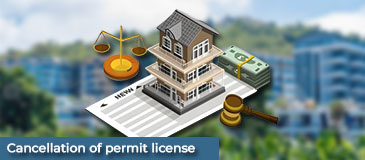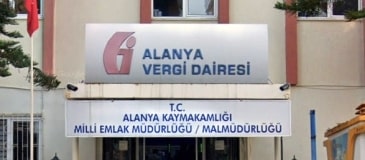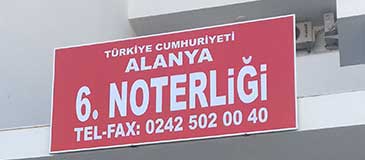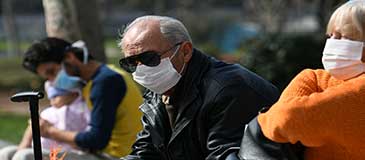Permit Certificate and Sanctions of Short-Term Property Rentals
Recommended article : Turkish Legislation on Short-Term Property Rentals
Nature of the Permit Certificate and Administrative Sanctions to be Applied
ARTICLE 3: Nature of the permit document
(1) In order to rent residences for tourism purposes, it is mandatory to obtain a permit before making a rental contract for tourism purposes. In addition, the plaque, whose qualifications are determined by the Ministry, is hung at the entrance of the house rented for tourism purposes.
(2) The Ministry is authorized to issue permits. The Ministry can also exercise this authority through the governorship. Permit certificate and plaque fees are determined by the Ministry.
(3) In permit applications, it is mandatory to present a decision unanimously agreed upon by all apartment owners of the building in which the independent section subject to the permit document for the tourism rental activity is located, indicating the approval for conducting tourism rental activities. For housing complexes consisting of multiple independent sections, the provisions of this paragraph apply only to the building where the rental for tourism purposes is conducted, and a copy of the permit document is submitted to the site management.
(4) In buildings consisting of more than three independent sections, a permit can be issued in the name of the same lessor for a maximum of 25%. If the number of independent sections subject to permit issuance in the same building under the same lessor exceeds five, in the application;
a) The business opening and operation permit,
b) In the case of the building in question being part of a housing complex consisting of multiple independent sections, in addition to the provision in the third paragraph, it is mandatory to present a decision unanimously agreed upon by all apartment owners.
(5) The obligation to obtain the permit belongs to the lessor. If rental activities for tourism purposes are carried out other than by the lessor, these rentals can be made exclusively through (A) group travel agencies certified in accordance with the Law on Travel Agencies and Association of Travel Agencies No. 1618 dated 14/9/1972.
(6) If the holder of the permit document is an individual, the permit becomes invalid if no application is made by the heirs within three months from the date of death. In the case of a legal entity, if its legal personality ceases to exist, the permit becomes invalid. However, the rights of the users continue until the end of the contract period.
(7) It is prohibited for the users of the leased residence under the permit holder to sublease it to third parties in their own name and on their account or for the lessee of the residence leased for residential purposes to sublease it for tourism purposes in their own name and on their account. However, allowing the personnel of legal entities to use the residence leased for tourism purposes is outside the scope of this paragraph.
(8) The provisions of the Law No. 1774 dated 26/6/1973 on Identity Notification shall apply to residences granted a permit for tourism rental purposes. The permit holder is considered the responsible person regarding the obligation to notify within the scope of the Law No. 1774.
(9) The contract made between the permit holder and the user terminates at the end of the duration specified in the contract.
(10) The provision allows short-term rental activities if included in the management plan prepared according to Article 28 of Condominium Law No. 634 dated 23/6/1965. It pertains to premises with amenities such as reception, security, and daily cleaning services. Permits can be granted for high-quality residences having multiple independent sections and offering services like health services, dry cleaning, laundry, transportation, food and shopping services, gym, and swimming pool without meeting the conditions in the third (3) and fourth (4) paragraphs. Rental activities in these high-quality residences can also be conducted by housing enterprises. In this scenario, the permit is issued in the name of the company managing the housing. Such rental activities conducted in this manner fall outside the scope of the seventh (7) paragraph.
ARTICLE 4: Administrative Sanctions to be Applied
(1) Administrative sanctions to be applied in case of unauthorized rental activities are determined as follows:
a) Those who rent out residences for tourism purposes without a permit will be subject to an administrative fine of one hundred thousand Turkish liras for each rented residence without a permit, and they will be given a fifteen-day period to obtain a permit to conduct their activities.
b) After the fifteen-day period, individuals continuing tourism rental activities without obtaining a permit will face an administrative fine of five hundred thousand Turkish liras, and once again, they will be given a further fifteen-day period to obtain the required permit.
c) Those who rent out tourism-purpose residences, leased from permit holders, to third parties in their own name and on their account will be subject to an administrative fine of one hundred thousand Turkish liras for each contract.
ç) Individuals who lease their residences, rented for residential purposes in their own name and on their account, for tourism purposes will face an administrative fine of one hundred thousand Turkish liras for each contract.
d) Individuals who mediate the rental of residences without permits for tourism purposes will be subject to an administrative fine of one hundred thousand Turkish liras for each contract.
e) For each residence, intermediary service providers defined in the Law on the Regulation of Electronic Commerce No. 6563 dated 23/10/2014, which enable electronic commerce and promotion of the activities falling within the scope of this paragraph and do not remove the content within twenty-four hours despite the warning made by the Ministry. An administrative fine of one hundred thousand Turkish liras is imposed. It is decided to remove the content and/or block access regarding the publication, section, section where the violation occurred, and this decision is sent to the Access Providers Association for implementation. Additionally, if this decision is not complied with, an administrative fine of one hundred thousand Turkish liras for each residence will be imposed on intermediary service providers. An appeal may be made to the criminal judgeship of peace against the decision to remove content and/or block access. An objection may be made against the decision made by the criminal judgeship of peace in accordance with the provisions of the Criminal Procedure Code No. 5271 dated 4/12/2004.
f) Despite the implementation of the provisions in clauses (a) and (b), individuals continuing tourism rental activities without a permit will face an administrative fine of one million Turkish liras.
g) Individuals who, despite making lease agreements for more than one hundred days each time, rent out the same residence more than four times within one year from the date of the initial agreement will face an administrative fine of one million Turkish liras.
(2) Administrative sanctions to be applied to permit holders are determined below:
a) If the information and documents requested by the Ministry are not sent within thirty days, if they are sent incompletely, or if misleading information or documents are given, an administrative fine of fifty thousand Turkish Liras will be imposed.
b) If the lessor changes due to a legal transaction other than inheritance and this change is not notified to the land registry within thirty days from the date of registration, an administrative fine of fifty thousand Turkish liras will be imposed.
c) If the document regarding the payment of tourism share within the scope of the Law on Turkey Tourism Promotion and Development Agency No. 7183 dated 11/7/2019 is not submitted within the period determined by the Ministry or if this document is not presented during the inspections to be carried out, an administrative fine of fifty thousand Turkish Liras will be imposed.
ç) An administrative fine of one hundred thousand Turkish liras will be applied in cases where the residence rented for tourism purposes is misleadingly presented to users through written materials, advertisements, banners, brochures, social media, websites, or similar means regarding its location, characteristics, and physical attributes, or when promised conditions are not met, or if the residence rented for tourism purposes is allocated to the user for a shorter period than specified in the contract.
d) If the house rented for tourism purposes is not delivered to the user in accordance with the contract, an administrative fine of one hundred thousand Turkish Liras is imposed.
e) If the payment received is not refunded within the fifteen-day period following the application of paragraph (d), an administrative fine of two hundred thousand Turkish liras will be imposed.
f) If the plaque prepared by the Ministry is not hung at the entrance of the residences rented for tourism purposes, an administrative fine of one hundred thousand Turkish Liras is imposed and fifteen days are given for hanging it.
g) Despite the application of paragraph (f), if the plaque is not hung at the entrance of the residence rented for tourism purposes within fifteen days, an administrative fine of five hundred thousand Turkish liras will be imposed.
ğ) If, during the inspection, it is determined that the house does not meet the qualifications required for the issuance of a permit, an administrative fine of one hundred thousand Turkish Liras is imposed and fifteen days are given to correct the violations.
(3) Except for subparagraph (e), the administrative sanctions specified in the first paragraph are determined and implemented by the highest civil administrator of the locality where the residence is located, and the administrative sanctions specified in subparagraph (e) of the first paragraph and the second paragraph are determined and implemented by the Ministry.
Please make sure to read the other articles.


 Print Page
Print Page
 Copy Link
Copy Link














